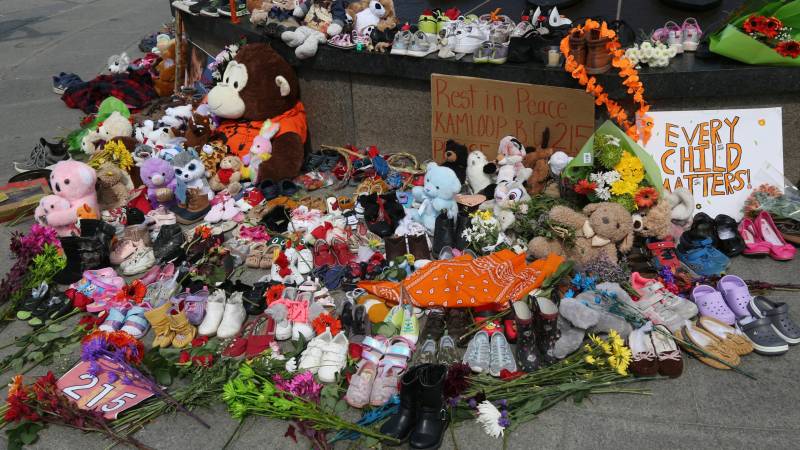Hundreds of shoes highlight horrors of Canadian indigenous schools abuses

Stay tuned with 24 News HD Android App

On the verge of tears, Stephanie Gutierrez helped place 215 tiny pairs of children's shoes on the steps of the Kamloops courthouse in western Canada -- a gesture that the indigenous woman said symbolized her intent "to stand strong for my people."
A week after the remains of more than 200 students were discovered in unmarked graves at the Kamloops Indian Residential School in British Columbia, approximately a dozen indigenous Canadians, mostly women, gathered at the building Wednesday to demand justice via the memorial.
Each pair of shoes represents one of the children who died at the boarding school, set up more than a century ago to forcibly assimilate Canada's indigenous peoples.
Gutierrez's grandmother Tillie had attended the school where the Tk'emlups te Secwepemc tribe last week said it had discovered the mass grave site using ground-penetrating radar.
"Unimaginable things happened in this school," said Gutierrez, wearing an orange T-shirt that read "every child matters" and gripping a photograph of her late grandmother.
"I'm here today to stand strong for my people, and to stand strong for my grandmother, and to stand strong for those who cannot speak because this is such a tragedy," she said.
Similar memorials have popped up at churches and government buildings across Canada, including outside parliament in Ottawa, where Prime Minister Justin Trudeau paid his respects on Tuesday.
Gutierrez said she wanted people to understand the pain provoked by the legacy of the Kamloops school.
"These children were stolen, they were taken from their families, and they were tortured, and then they were murdered," she said.
The Kamloops school east of Vancouver was the largest of 139 such boarding schools established across Canada in the late 19th century, with up to 500 students attending at any one time.
It was operated by the Catholic Church on behalf of the Canadian government from 1890 to 1969, and then was taken over by Ottawa until it closed a decade later.
In total, some 150,000 Indian, Inuit and Metis youngsters were enrolled in these schools, where students were physically and sexually abused by headmasters and teachers who stripped them of their culture and language.
Today those experiences are blamed for a high incidence of poverty, alcoholism and domestic violence, as well as high suicide rates, in Canada's indigenous communities.
A truth and reconciliation commission in 2015 concluded that more than a century of abuses at the schools amounted to "cultural genocide."
It also identified at least 4,100 children who died from abuse or neglect while attending a residential school. But it estimates the actual toll is much higher.
The British Columbia coroner is now helping the Tk'emlups te Secwepemc tribe establish the causes and timing of the student deaths in Kamloops.
A lot of emotions
Meanwhile, the grim find has triggered an outpouring of sympathy across Canada for the students' families and communities, with searches for other mass graves being planned.
Parents' requests to have their sons or daughters' remains returned home at the time of their deaths had been rejected by the government as too costly.
Now, most of the school cemeteries where they are interred have been abandoned.
For many indigenous people, the discovery of the unmarked graves has sparked anew grief and anger. Many had long known about the burials, but kept silent for decades as the memories were too painful.
"I was in shock," said Gutierrez, who said the latest news "triggered me a lot, it brought up a lot of emotions... There are so many people that have been triggered."
"I feel like I'm strong enough to stand here for those who cannot speak. That's why I'm here, so that people know what's going on," she said.
Gutierrez and others deposited the shoes on the steps of the Kamloops courthouse, where a Canadian flag was lowered to half-mast, "to demonstrate that we want justice for these children," she said.
Bernadette Mack, of the coastal Nuxalk First Nation, came to help and show her support, saying: "It's important to raise awareness and educate people (about) residential schools."
News of the discovery "has brought everybody together," she said. Until then, "some people didn't really believe it happened and this was proof that it did."
"As sad as it is, it's great that people are understanding (now) that it did happen."
Lack of papal apology 'shameful'
Canada's indigenous services minister said Wednesday it is "shameful" that the Pope has never formally apologized for abuses at the country's Catholic-run indigenous residential schools, which he termed "labor camps."
Marc Miller's comments followed the recent discovery of unmarked graves of 215 children in Kamloops at one of 139 boarding schools set up a century ago to forcibly assimilate Canada's indigenous peoples.
"I do, I do," the minister told a news conference when asked if he supports growing indigenous calls for a papal apology that date back to a 2015 truth and reconciliation commission report, and before.
"I think it is shameful that they haven't done it, that it hasn't been done to date," he said. "It should be done. There is a responsibility that lies squarely on the shoulders of the Council of Bishops in Canada."
Labor camps
The Kamloops Indian Residential School in British Columbia, where the unmarked graves were discovered last week using ground-penetrating radar, was operated by the Catholic church on behalf of Ottawa from 1890 to 1969.
Some 150,000 Indian, Inuit and Metis youngsters in total were forcibly enrolled in these schools, where students were physically and sexually abused by headmasters and teachers who stripped them of their culture and language.
Pope Francis's subsequent refusal in 2018 -- after Canada's parliament passed a motion again asking the pontiff to apologize -- drew a polite rebuke from Prime Minister Justin Trudeau, saying he was "disappointed" with the church's decision.
